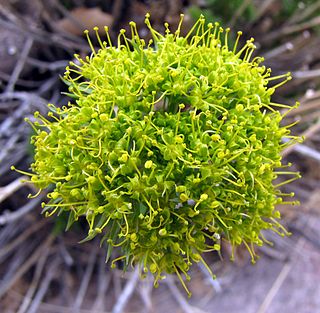
Nolina parryi is a flowering plant that is native to Baja California, southern California and Arizona.

Diplacus rupicola, the Death Valley monkeyflower, is a flowering plant in the family Phrymaceae.

Penstemon parryi, the Parry's penstemon, Parry's beardtongue or desert penstemon, is a wildflower native to the Sonoran Desert of Southern Arizona and northern Mexico. It is a perennial that blooms in March and April. In the wild, plants flower in their second year. In cultivation, flowering is often achieved in the first year if seed is planted in the autumn.

Lomatium parryi, commonly known as Parry's biscuitroot and Utah desertparsley, is a perennial herb in the carrot family. It is a common herb in high altitude areas of deserts and common in desert National parks, such as Death Valley mountains, in the western part of the United States.

Diplacus angustatus is a species of monkeyflower known by the common names purplelip pansy monkeyflower and narrowleaf pansy monkeyflower.

Diplacus clevelandii is an uncommon species of monkeyflower known by the common name Cleveland's bush monkeyflower. It was formerly known as Mimulus clevelandii.

Diplacus jepsonii, formerly classified as Mimulus nanus var. jepsonii, is a species of monkeyflower known by the common name Jepson's monkeyflower.

Diplacus mephiticus is a species of monkeyflower known by the common names skunky monkeyflower and foul odor monkeyflower. It was formerly known as Mimulus mephiticus.

Diplacus nanus is a species of monkeyflower known by the common name dwarf purple monkeyflower. It is native to California and the Northwestern United States to Montana. It grows in moist habitat, often in bare or disturbed soils. It was formerly known as Mimulus nanus.

Diplacus pictus is a species of monkeyflower known by the common name calico monkeyflower.

Diplacus whitneyi is a species of monkeyflower known by the common name Harlequin monkeyflower. It was formerly known as Mimulus lewisii. It is also known as Diplacus bicolor.

Primula parryi, or Parry's primrose, is a herbaceous perennial native to wet areas from the subalpine zone to alpine tundra in the Rocky Mountains from Montana to Arizona and New Mexico.

Diplacus puniceus, commonly known as the red bush monkeyflower, San Diego monkey flower, or mission diplacus, is a species of perennial shrub native to coastal southern California and northern Baja California. It is characterized by a relatively small and broad corolla for Diplacus, a lack of glandular hairs, and dark orange or red flowers, adapted to hummingbird pollinators.

Diplacus vandenbergensis, commonly known as the Vandenberg monkeyflower, is a species of Diplacus located in the Phrymaceae family. It grows as a small herbaceous annual plant and is native to the Burton Mesa Ecological Reserve in Santa Barbara County, California. According to the U.S. Fish and Wildlife Service it is an endangered species and hence was allocated critical habitat within the reserve in 2014.

Diplacus longiflorus, commonly known as southern bush monkeyflower, is a species of monkeyflower native to southwestern California and Baja California Norte (Mexico).

Diplacus parviflorus, also known as the island bush monkeyflower, is a species of flowering plant endemic to California. This monkeyflower is an uncommon plant found only on four of the Channel Islands of California and in San Diego County. This plant sometimes hybridizes with Diplacus longiflorus. This species is attractive to butterflies including the western buckeye, mylitta crescent, and the variable checkerspot. This species was formerly considered part of the Mimulus aurantiacus species complex.
Diplacus brandegeei, also known as the Santa Cruz Island monkeyflower, is a species of flowering plant. This rare flower survives on Guadalupe Island in Mexico, but is believed to be extirpated on Santa Cruz Island in the United States, possibly because of livestock grazing. This plant has U.S. federal or California state protected status.

Diplacus calycinus, also known as the Kaweah River rock bush monkeyflower, is a species of flowering plant. This California endemic plant is usually found growing on granite outcrops, boulders, or rocky washes.

Diplacus ovatus, also known as steamboat monkeyflower, Carson monkeyflower, or eggleaf monkeyflower, is a species of flowering plant. This plant is only known from three locations in the U.S. state of Nevada, including Steamboat Hot Springs.

Diplacus linearis, also known as the Monterey monkeyflower or the chaparral bush monkeyflower, is a species of flowering plant. It has been observed in Monterey, San Benito, and San Luis Obispo counties in California.



















